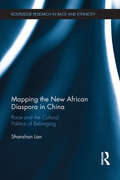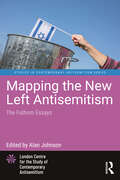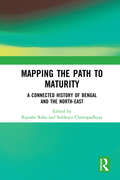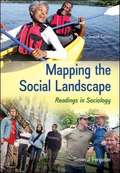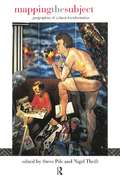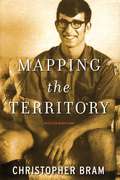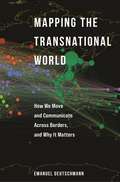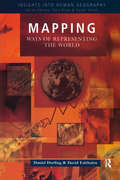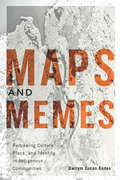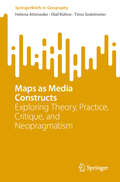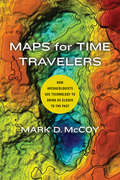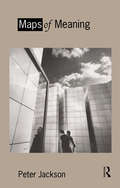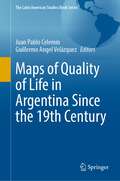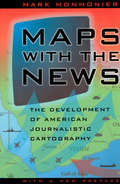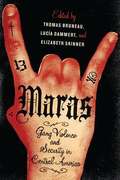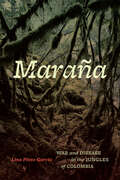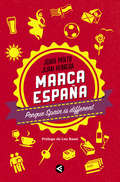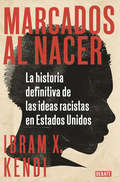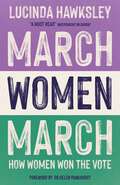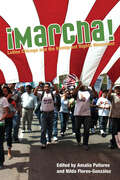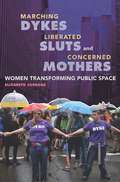- Table View
- List View
Mapping the New African Diaspora in China: Race and the Cultural Politics of Belonging (Routledge Research in Race and Ethnicity)
by Shanshan LanWhen one thinks of African diasporas, it is likely that their mind will automatically drift to locations such as Europe and America. But how much is known about the African diaspora in East Asia and, in particular, within China, where race is such a politically sensitive topic? Based on multi-sited ethnographic research in China and Nigeria, Mapping the New African Diaspora in China explores a new wave of African migration to South China in the context of the expansion of Sino/African trade relations and the global circulation of racial knowledge. Indeed, grassroots perspectives of China/Africa trade relations are foregrounded through the examination of daily interactions between Africans and rural-to-urban Chinese migrants in various informal trade spaces in Guangzhou. These Afro-Chinese encounters have the potential to not only help reveal the negotiated process of mutual racial learning, but also to subvert hegemonic discourses such as Sino/African friendship and white supremacy in subtle ways. However, as Lan demonstrates within this enlightening volume, the transformative power of such cross-cultural interactions is severely limited by language barrier, cultural differences, and the Chinese state’s stringent immigration control policies. This book will appeal to scholars and students in the fields of China/Africa relations, race and ethnic studies, globalization and transnational migration, and urban China studies, as well as those from other social science disciplines such as political science, international relations, urban geography, Asian Studies, African studies, sociology, development studies, and cross-cultural communication studies. It may also appeal to policymakers and non-profit organizations involved in providing services and assistance to migrant populations.
Mapping the New Left Antisemitism: The Fathom Essays (Studies in Contemporary Antisemitism)
by Alan JohnsonMapping the New Left Antisemitism: The Fathom Essays provides a comprehensive guide to contemporary Left antisemitism. The rise of a new and largely left-wing form of antisemitism in the era of the Jewish state and the distinction between it and legitimate criticism of Israel are now roiling progressive politics in the West and causing alarming spikes in antisemitic incitement and incidents. Fathom journal has examined these questions relentlessly in the first decade of its existence, earning a reputation for careful textual analysis and cogent advocacy. In this book, the Fathom essays are contextualised by three new contributions: Lesley Klaff provides a map of contemporary antisemitic forms of antizionism, Dave Rich writes on the oft-neglected lived experience of the Jewish victims of contemporary antisemitism and David Hirsh assesses the intellectual history of the left from which both Fathom and his own London Centre for the Study of Contemporary Antisemitism, as well as this book series, have emerged. Topics covered by the contributors include antisemitic antizionism and its underappreciated Soviet roots; the impact of analogies with the Nazis; the rise of antisemitism on the European continent, exploring the hybrid forms emerging from a cross-fertilisation between new left, Christian and Islamist antisemitism; the impact of antizionist activism on higher education; and the bitter debates over the adoption of the oft-misrepresented International Holocaust Remembrance Alliance (IHRA) definition of antisemitism. This work will be of considerable appeal to scholars and activists with an interest in antisemitism, Jewish studies and the politics of Israel.
Mapping the Path to Maturity: A Connected History of Bengal and the North-East
by Bipasha Raha Subhayu ChattopadhyayThis book delves into varied aspects of the history of Bengal and North east situated within a time frame of more than a hundred years, from the colonial times to the present. The individual essays deal with ideas, literary texts, politics, gender, industries, culture, health, sports and tribal issues relevant to these regions. Probing health issues in the colonial period the volume also explains the development of the modern coal industry on the one hand and the survival of the traditional potter’s craft on the other. The significance of traditional healing practices is dwelt upon as also the question of female health and dissemination of knowledge. The pen-picture of the happenings at the bathing ghat reveals the vibrant rural social life of the times. The modernization of the theatre gives a glimpse into the cultural ethos. The institutionalization of sports is examined. Analysis of contemporary cinema throws light on the perception of a woman’s position in society. As the reader travels from Bengal to the North-East, the impact of missionary activities on tribal life is revealed. The tribals’ search for identity is explored. The issues of peace, security and the interests of independent India are also dissected. This volume would be indispensable for scholars of literature, history, film studies, political science and contemporary studies in South Asia. Please note: Taylor & Francis does not sell or distribute the Hardback in India, Pakistan, Nepal, Bhutan, Bangladesh and Sri Lanka
Mapping the Social Landscape: Readings in Sociology
by Susan J. FergusonThis best-selling anthology providesexcellent coverage of key concepts in sociologyincluding culture, socialization, deviance, social structure, social institutions, and social inequality. Drawing from awide selection of classic and contemporary works,the 58 selections represent a plurality of voices and views within sociology. Students will be introduced tocutting edge scholarship and perspectivesthrough classical readings from great thinkers like C. Wright Mills, Karl Marx, Howard Becker, and Max Weber and contemporary articles on current issues like gender socialization, healthcare reform, and minorities in the power elite. By integrating issues of diversity throughout the book,Ferguson helps students see the interrelationships between race-ethnicity, social class, and gender, as well as how these relationships have shaped the experiences of all people in society. Each selection is preceded by a brief introduction that highlights the key sociological concepts for students consider as they read.
Mapping the Sociology of Health and Medicine
by Fran CollyerThis book studies the sociology of health and medicine across three different countries, the USA, UK and Australia, examining the nature of disciplines and their specialties and posing sociological questions about the formation of intellectual fields and their social relations.
Mapping the Subject: Geographies of Cultural Transformation
by Nigel Thrift Steve PileRejecting static and reductionist understandings of subjectivity, this book asks how people find their place in the world. Mapping the Subject is an inter-disciplinary exploration of subjectivity, which focuses on the importance of space in the constitution of acting, thinking, feeling individuals. The authors develop their arguments through detailed case studies and clear theoretical expositions. Themes discussed are organised into four parts: constructing the subject, sexuality and subjectivity, the limits of identity, and the politics of the subject. There is, here, a commitment to mapping the subject - a subject which is in some ways fluid, in other ways fixed; which is located in constantly unfolding power, knowledge and social relationships. This book is, moreover, about new maps for the subject.
Mapping the Territory: Selected Nonfiction
by Christopher BramNovelist Christopher Bram has been writing essays for twenty-five years. Mapping the Territory, his first collection of nonfiction, ranges through such topics as the power of gay fiction, coming out in the 1970s in Virginia, low-budget filmmaking with friends in New York, and the sexual imagination of Henry James. He describes the heady experience of seeing his novel Gods and Monsters made into an Oscar-winning movie starring Ian McKellen, Brendan Fraser, and Lynn Redgrave; and he discusses why he and his partner of thirty years don't want to get married. Bram looks both into and out of himself in these essays. He revisits the titles he read while finding himself as a gay man, and he also shows us Greenwich Village as seen from his front stoop. The book is not simply a collection of short pieces--it's an autobiography of ideas from one of today's most lively and popular novelists.
Mapping the Transnational World: How We Move and Communicate across Borders, and Why It Matters (Princeton Studies in Global and Comparative Sociology)
by Emanuel DeutschmannA study of the structure, growth, and future of transnational human travel and communicationIncreasingly, people travel and communicate across borders. Yet, we still know little about the overall structure of this transnational world. Is it really a fully globalized world in which everything is linked, as popular catchphrases like “global village” suggest? Through a sweeping comparative analysis of eight types of mobility and communication among countries worldwide—from migration and tourism to Facebook friendships and phone calls—Mapping the Transnational World demonstrates that our behavior is actually regionalized, not globalized.Emanuel Deutschmann shows that transnational activity within world regions is not so much the outcome of political, cultural, or economic factors, but is driven primarily by geographic distance. He explains that the spatial structure of transnational human activity follows a simple mathematical function, the power law, a pattern that also fits the movements of many other animal species on the planet. Moreover, this pattern remained extremely stable during the five decades studied—1960 to 2010. Unveiling proximity-induced regionalism as a major feature of planet-scale networks of transnational human activity, Deutschmann provides a crucial corrective to several fields of research.Revealing why a truly global society is unlikely to emerge, Mapping the Transnational World highlights the essential role of interaction beyond borders on a planet that remains spatially fragmented.
Mapping: Ways of Representing the World (Insights Into Human Geography)
by Daniel Dorling David FairbairnIllustrates how maps tell us as much about the people and the powers which create them, as about the places they show. Presents historical and contemporary evidence of how the human urge to describe, understand and control the world is presented through the medium of mapping, together with the individual and environmental constraints of the creator of the map.
Maps and Memes
by Gwilym Lucas EadesMaps and cartography have long been used in the lands and resources offices of Canada's indigenous communities in support of land claims and traditional-use studies. Exploring alternative conceptualizations of maps and mapmaking, Maps and Memes theorizes the potentially creative and therapeutic uses of maps for indigenous healing from the legacies of residential schools and colonial dispossession. Gwilym Eades proposes that maps are vehicles for what he calls "place-memes" - units of cultural knowledge that are transmitted through time and across space. Focusing on Cree, Inuit, and northwest coast communities, the book explores intergenerational aspects of mapping, landscape art practice, and identity. Through decades of living in and working with indigenous communities, Eades has constructed an ethnographically rich account of mapping and spatial practices across Canada. His extended participation in northern life also informs this theoretically grounded account of journeying on the land for commemoration and community healing. Interweaving narrative accounts of journeys with academic applications for mapping the phenomena of indigenous suicide and suicide clusters, Maps and Memes lays the groundwork for understanding current struggles of indigenous youth to strengthen their identities and foster greater awareness of traditional territory and place.
Maps and Memes: Redrawing Culture, Place, and Identity in Indigenous Communities (McGill-Queen's Indigenous and Northern Studies #76)
by Gwilym Lucas EadesMaps and cartography have long been used in the lands and resources offices of Canada's indigenous communities in support of land claims and traditional-use studies. Exploring alternative conceptualizations of maps and mapmaking, Maps and Memes theorizes the potentially creative and therapeutic uses of maps for indigenous healing from the legacies of residential schools and colonial dispossession. Gwilym Eades proposes that maps are vehicles for what he calls "place-memes" - units of cultural knowledge that are transmitted through time and across space. Focusing on Cree, Inuit, and northwest coast communities, the book explores intergenerational aspects of mapping, landscape art practice, and identity. Through decades of living in and working with indigenous communities, Eades has constructed an ethnographically rich account of mapping and spatial practices across Canada. His extended participation in northern life also informs this theoretically grounded account of journeying on the land for commemoration and community healing. Interweaving narrative accounts of journeys with academic applications for mapping the phenomena of indigenous suicide and suicide clusters, Maps and Memes lays the groundwork for understanding current struggles of indigenous youth to strengthen their identities and foster greater awareness of traditional territory and place.
Maps as Media Constructs: Exploring Theory, Practice, Critique, and Neopragmatism (SpringerBriefs in Geography)
by Olaf Kühne Timo Sedelmeier Helena AttenederThis book fills a gap in the market by taking an introductory look at cartographic representations as multimedia constructs, from theory to critique to neopragmatist perspectives and in practice. It offers an interdisciplinary analysis from the fields of media and communication studies as well as geography and cartography to examine how cartographic representations as constructions of multimedia shape our options for appropriating space and possessing space-generating qualities. Examples from current social discourses such as the COVID-19 pandemic, debates on climate change, and sustainability plus the war in Ukraine show how multimedia cartographic representations are part of the communicative negotiation processes in public media spheres. The book offers insights into the theoretical foundations, historical developments, and practical applications of cartography, with a particular focus on the critical reflection of power structures and interests. It is aimed at students, researchers, and teachers, thereby inviting each to understand maps not only as technical artifacts but also as complex multimedia constructions.
Maps for Time Travelers: How Archaeologists Use Technology to Bring Us Closer to the Past
by Mark D. McCoyPopular culture is rife with movies, books, and television shows that address our collective curiosity about what the world was like long ago. From historical dramas to science fiction tales of time travel, audiences love stories that reimagine the world before our time. But what if there were a field that, through the advancements in technology, could bring us closer to the past than ever before? Written by a preeminent expert in geospatial archaeology, Maps for Time Travelers is a guide to how technology is revolutionizing the way archaeologists study and reconstruct humanity’s distant past. From satellite imagery to 3D modeling, today archaeologists are answering questions about human history that could previously only be imagined. As archaeologists create a better and more complete picture of the past, they sometimes find that truth is stranger than fiction.
Maps of Meaning: An Introduction To Cultural Geography (Contours Ser. #Vol. 1)
by Peter JacksonThis innovative book marks a significant departure from tradition anlayses of the evolution of cultural landscapes and the interpretation of past environments. Maps of Meaning proposes a new agenda for cultural geography, one set squarely in the context of contemporary social and cultural theory. Notions of place and space are explored through the study of elite and popular cultures, gender and sexuality, race, language and ideology. Questioning the ways in which we invest the world with meaning, the book is an introduction to both culture's geographies and the geography of culture.
Maps of Quality of Life in Argentina Since the 19th Century (The Latin American Studies Book Series)
by Juan Pablo Celemin Guillermo Angel VelázquezThe book is presented as an Atlas where the map plays a fundamental role in the study of quality of life, as it shows its progression in Argentina from the 19th to the 21st Century. In the book, it can be observed how the concept has evolved along with the dimensions and variables that better represent its spatial distribution. This is one of the original points of the book: the temporal study of the living conditions of the argentine population, empirically and spatially, emphasizing their territorial representation. Although the book maintains the same socioeconomic dimensions (education, health and housing), the tour through the different chapters offers a historical window that allows the reader to know what the forms of information collection were like in different historical moments. This book is written for geographers and members of the scientific community interested in the study of the well-being of the population. It also allows us to observe the evolution of the quality of life from the 19th century to the 21st, so it may be of interest to historians as well.
Maps with the News: The Development of American Journalistic Cartography (John D. And Catherine T. Macarthur Foundation Series On Mental Health And Development)
by Mark MonmonierMaps with the News is a lively assessment of the role of cartography in American journalism. Tracing the use of maps in American news reporting from the eighteenth century to the 1980s, Mark Monmonier explores why and how journalistic maps have achieved such importance. "A most welcome and thorough investigation of a neglected aspect of both the history of cartography and modern cartographic practice."—Mapline "A well-written, scholarly treatment of journalistic cartography. . . . It is well researched, thoroughly indexed and referenced . . . amply illustrated."—Judith A. Tyner, Imago Mundi "There is little doubt that Maps with the News should be part of the training and on the desks of all those concerned with producing maps for mass consumption, and also on the bookshelves of all journalists, graphic artists, historians of cartography, and geographic educators."—W. G. V. Balchin, Geographical Journal "A definitive work on journalistic cartography."—Virginia Chipperfield, Society of University Cartographers Bulletin
Maras
by Elizabeth Skinner Thomas Bruneau Lucéa DammertSensational headlines have publicized the drug trafficking, brutal violence, and other organized crime elements associated with Central America's mara gangs, but there have been few clear-eyed analyses of the history, hierarchies, and future of the mara phenomenon. The first book to look specifically at the Central American gang problem by drawing on the perspectives of researchers from different disciplinary backgrounds, Maras: Gang Violence and Security in Central America provides much-needed insight. These essays trace the development of the gangs, from Mara Salvatrucha to the 18th Street Gang, in Los Angeles and their spread to El Salvador, Honduras, Guatemala, and Nicaragua as the result of members' deportation to Central America; there, they account for high homicide rates and threaten the democratic stability of the region. With expertise in areas ranging from political science to law enforcement and human rights, the contributors also explore the spread of mara violence in the United States. Their findings comprise a complete documentation that spans sexualized violence, case studies of individual gangs, economic factors, varied responses to gang violence, the use of intelligence gathering, the limits of state power, and the role of policy makers. Raising crucial questions for a wide readership, these essays are sure to spark productive international dialogues.
Maraña: War and Disease in the Jungles of Colombia
by Lina Pinto-GarcíaDelves into the relationship between war and disease, focusing on Colombian armed conflict and the skin disease known as cutaneous leishmaniasis. Cutaneous leishmaniasis, transmitted by female sandflies, produces skin lesions of varying size and shape. In Colombia, the insect vector of the disease is native to the same forested environments that have served as the main stage for one of the longest and most violent wars in Latin American history. As a result, the populations most affected by leishmaniasis in Colombia are members of the state army and nonstate armed groups. Lina Pinto-García explores how leishmaniasis and the armed conflict are inextricably connected and mutually reinforcing. Maraña means “tangle” in Spanish but is also commonly used in Colombia to name the entangled greenery, braided lianas, and dense foliage that characterize the tropical forests where leishmaniasis transmission typically occurs. Pinto-García argues that leishmaniasis and the war are not merely linked but enmarañadas to each other through narratives, technologies, and practices produced by the state, medicine, biomedical research, and the armed conflict itself. All told, Maraña is a passionate study of how war has shaped the production of scientific knowledge about leishmaniasis and access to its treatments in Colombia.
Marca España
by Jordi MoltóEl ADN ibérico en estado puro. Marca España es una mirada hilarante y ácida sobre los usos y costumbres del español medio. ¿Por qué nos gusta tanto el fútbol? ¿Cuáles son las verdaderas cualidades del macho ibérico? ¿Cómo es posible que en un barrio de Madrid haya más bares que en toda Noruega? ¿Por qué tenemos ese gusto especial por todo lo que es gratis? ¿De dónde le viene el amor por el jamón ibérico y la tortilla de patatas? ¿Cómo se desenvuelve el español en el trabajo? ¿Es verdad que gritamos demasiado? Todo esto y mucho más lo descubrimos en este magnífico libro en el que Jordi Moltó y Juan Herrera nos desvelan con cifras, estudios y mucho humor las verdades y mentiras acerca de los tópicos españoles más comunes. Porque la capacidad de los españoles de reírnos de nosotros mismos ¡también es Marca España!
Marcados al nacer: La historia definitiva de las ideas racistas en Estados Unidos
by Ibram X. KendiEL MEJOR LIBRO PARA ENTENDER CÓMO SE INSTITUCIONALIZA EL RACISMO. GANADOR DEL NATIONAL BOOK AWARD DE NO FICCIÓN EN 2016 Tras la elección de Barack Obama, muchos declararon el inicio de una era postracial. Sin embargo, el pensamiento racista, más sofisticado e insidioso que nunca, sigue profundamente arraigado en la sociedad estadounidense. Tal y como argumenta Ibram X. Kendi-la voz más influyente de la lucha antirracista y uno de los referentes actuales del movimiento #BlackLivesMatter-,aunque las ideas racistas se desarrollan, difunden y consagran muy fácilmente, también se las puede desacreditar. Y esto es lo que se propone con Marcados al nacer, una obra maestra galardonada con el National Book Award que derriba la idea, muy asentada, de que el racismo es consecuencia directa de la ignorancia o el odio. En esta investigación histórica profundamente documentada, Kendi nos demuestra cómo en Estados Unidos las mentes más brillantes de diferentes épocas se han esforzado en crear y perpetuar instituciones racistas y un sistema basado en políticas discriminatorias, para luego generar ideas y actitudes racistas que justifiquen ex post facto la esclavitud y la segregación. Al hablar sin tapujos del racismo y de su turbia historia, este libro nos dota de las herramientas necesarias para desenmascararlo, y se convierte en una lectura indispensable en los tiempos que corren. La crítica ha dicho...«Dado el momento político que atravesamos, este libro debería estar en la estantería de todos los jóvenes que aspiran a cambiar el mundo. No es una lectura agradable, pero la verdad no siempre lo es.»Forbes «Absorbente e implacable.»The Washington Post «Una crónica profunda y a menudo inquietante.»The Atlantic «Una historia asombrosa historia, a la vez rigurosa y accesible.»The New Republic
March 4, anniversary edition: Scientists, Students, and Society (The\mit Press Ser.)
by Jonathan AllenScientists debate the role of scientific research in the military-industrial complex and consider the complicity of academic science in American wars.On March 4, 1969, MIT faculty and students joined together for an extraordinary day of protest. Growing out of the MIT community's anguish over the Vietnam War and concern over the perceived complicity of academic science with the American war machine, the events of March 4 and the days following were a “positive protest”—a forum not only for addressing political and moral priorities but also for mapping out a course of action. Soon afterward, some of the participants founded the Union of Concerned Scientists. This book documents the March 4 protest with transcripts of talks and panel discussions. Speakers included Noam Chomsky, Howard Zinn, Lionel Trilling, and Nobel Laureate George Wald, whose memorable speech, “A Generation in Search of a Future,” was widely circulated. Topics of discussion ranged from general considerations of the intellectuals' political responsibility to specific comments on the Vietnam War and nuclear disarmament. This fiftieth anniversary edition adds a foreword by Kurt Gottfried, a physicist, participant in the March 4 protest, and cofounder of the Union of Concerned Scientists. He writes, forcefully and hopefully, “Fifty years ago, a remarkable awakening was occurring among American scientists about their role in society. This volume offers a fascinating snapshot of that moment on March 4, 1969, and the activities and discussions collected here remain relevant and resonant today.” In an era when many politicians routinely devalue science, we can take inspiration from the March 4 protests.
March, Women, March: Voices Of The Women's Movement From The First Feminist To Votes For Women
by Lucinda Hawksley'A wonderful, inspiring story told with scholarship, passion and wit' – Miriam Margolyes'A must-read' – Independent on SundayWith an introduction by Dr Helen Pankhurst.An illuminating and riveting exploration of the women's movement in Britain, and the extraordinary women behind it.From the passing of the Marriage and Divorce Act in 1857 to all women attaining the vote in 1928, the struggle for suffrage in the United Kingdom was to be fought using the weapons of intellect, searing rhetoric, and violence in the streets. Ordinary women rose up to defy the roles prescribed by their society to become heroes in the battle for equality.Using anecdotes and accounts by both famous and hitherto lesser-known suffragettes and suffragists, March, Women, March explores how the voices of women came to be heard throughout the land in the pursuit of equal voting rights for all women. Lucinda Hawksley brings the main protagonists of the women's movement to life, sharing diary extracts and letters that show the true voices of these women, while their portrayals in literature and art – as well as the media reports of the day – show just how much of an impact these trailblazers made.'An accessible and engaging guide to the original women's movement' – Daily Telegraph
Marcha: Latino Chicago and the Immigrant Rights Movement (Latinos in Chicago and Midwest)
by Leon Fink Elena R. Gutiérrez Nilda Flores-González Xóchitl Bada Frances R. Aparicio José Antonio Arellano David Bleeden Ralph Cintrón Stephen P Davis Caroline Gottschalk Druschke Juan R Martinez Sonia Oliva Irma M Olmedo Amalia Pallares José Perales-Ramos Leonard G Ramírez Michael Rodríguez Muñiz R. Stephen WarnerMarcha is a multidisciplinary survey of the individuals, organizations, and institutions that have given shape and power to the contemporary immigrant rights movement in Chicago. A city with longstanding historic ties to immigrant activism, Chicago has been the scene of a precedent-setting immigrant rights mobilization in 2006 and subsequent mobilizations in 2007 and 2008. Positing Chicago as a microcosm of the immigrant rights movement on national level, these essays plumb an extraordinarily rich set of data regarding recent immigrant rights activities, defining the cause as not just a local quest for citizenship rights, but a panethnic, transnational movement. The result is a timely volume likely to provoke debate and advance the national conversation about immigration in innovative ways.
Marching Dykes, Liberated Sluts, and Concerned Mothers: Women Transforming Public Space
by Elizabeth CurransFrom the Women in Black vigils and Dyke marches to the Million Mom March, women have seized a dynamic role in early twenty-first century protest. The varied demonstrations--whether about gender, sexuality, war, or other issues--share significant characteristics as space-claiming performances in and of themselves beyond their place in any broader movement. Elizabeth Currans blends feminist, queer, and critical race theory with performance studies, political theory, and geography to explore the outcomes and cultural relevance of public protest. Drawing on observation, interviews, and archival and published sources, Currans shows why and how women utilize public protest as a method of participating in contemporary political and cultural dialogues. She also examines how groups treat public space as an important resource and explains the tactics different women protesters use to claim, transform, and hold it. The result is a passionate and pertinent argument that women-organized demonstrations can offer scholars a path to study the relationship of gender and public space in today's political culture.
